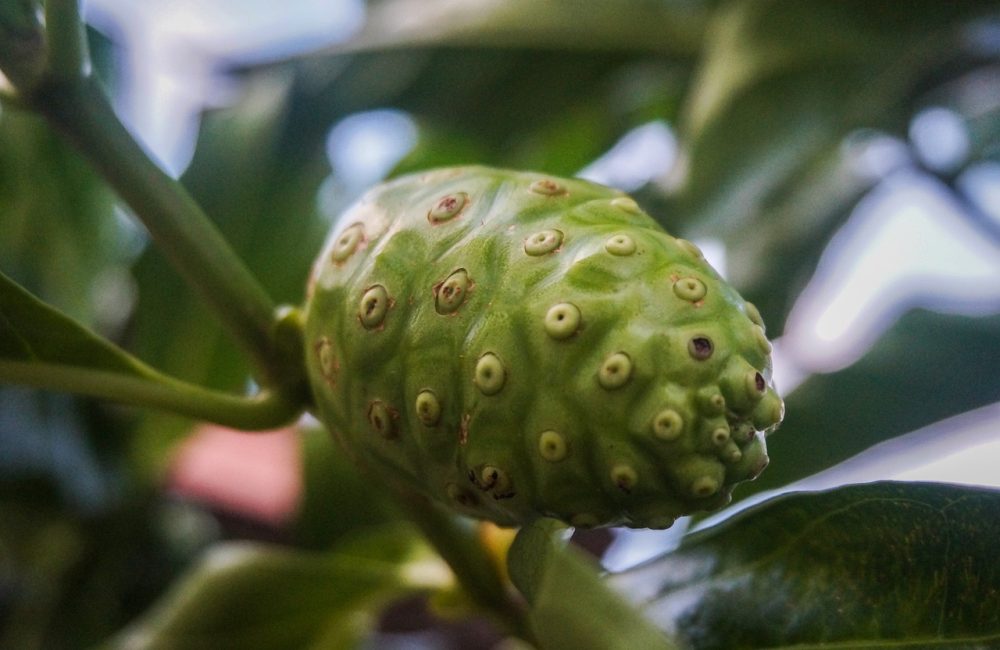Noni juice, derived from the fruit of the Morinda citrifolia tree, is widely known for its potent medicinal properties and numerous health benefits. Native to Southeast Asia, the Pacific Islands, and parts of the Caribbean, noni fruit has been used for centuries in traditional medicine to treat a variety of ailments. Packed with antioxidants, vitamins, and essential nutrients, noni juice offers a range of health benefits that can improve your overall well-being.
In this article, we’ll explore the 15 amazing benefits of noni juice, highlighting its impact on your immune system, skin health, and more.
1. Boosts Immune System Function
One of the primary benefits of noni juice is its ability to boost immune system function. It contains essential nutrients like vitamin C, vitamin E, and selenium, which are crucial for strengthening the immune system. These nutrients help your body produce and activate white blood cells, which play a vital role in fighting off infections and illnesses.
Noni juice also contains powerful antioxidants that help neutralize free radicals, reducing oxidative stress and supporting a stronger immune defense. Drinking noni juice regularly can enhance your body’s ability to fend off pathogens, making it an excellent choice for overall immune support.
2. Rich in Antioxidants
Noni juice is packed with antioxidants such as beta-carotene, vitamin C, vitamin E, and flavonoids, which help protect the body from oxidative damage caused by free radicals. Oxidative stress can lead to chronic diseases like heart disease, diabetes, and cancer, making antioxidants a key component in maintaining optimal health.
By drinking noni juice, you can support your body’s natural ability to neutralize harmful free radicals, reducing the risk of oxidative damage and promoting longevity.
3. Improves Skin Health
Noni juice has been lauded for its positive effects on skin health. The juice contains antioxidants and anti-inflammatory compounds that can improve skin texture, reduce signs of aging, and protect against environmental damage. Noni’s rich supply of vitamin C helps stimulate collagen production, which is essential for maintaining skin elasticity and reducing wrinkles.
In addition, noni juice’s anti-inflammatory properties can help soothe skin conditions like eczema, psoriasis, and acne, making it a natural remedy for various skin issues.
4. Supports Digestive Health
Noni juice is also known to promote digestive health by improving gut function and alleviating common digestive issues like constipation and indigestion. It acts as a natural laxative due to its fiber content, helping to regulate bowel movements and prevent constipation.
The juice’s ability to enhance the production of digestive enzymes can also help break down food more effectively, improving nutrient absorption and overall gut health.
5. Reduces Inflammation
Inflammation is at the root of many chronic diseases, including arthritis, cardiovascular disease, and autoimmune disorders. Noni juice contains anti-inflammatory compounds like scopoletin and quercetin, which help reduce inflammation in the body.
By incorporating noni juice into your diet, you can help alleviate symptoms of inflammatory conditions such as arthritis and joint pain, improving mobility and overall comfort.
6. Enhances Energy Levels
Many people who drink noni juice report feeling more energized and alert throughout the day. The juice contains natural compounds that help increase the production of adenosine triphosphate (ATP), the molecule responsible for cellular energy.
Drinking noni juice regularly can help combat fatigue, improve mental clarity, and provide a natural energy boost without the need for stimulants like caffeine.
7. Promotes Cardiovascular Health
Noni juice has been shown to have several benefits for cardiovascular health. It helps lower bad cholesterol (LDL) levels while increasing good cholesterol (HDL), which can reduce the risk of heart disease. The juice’s anti-inflammatory and antioxidant properties also help protect the blood vessels and arteries from oxidative damage, improving circulation and lowering blood pressure.
Regular consumption of noni juice may help reduce the risk of heart attacks, strokes, and other cardiovascular issues, making it a heart-healthy addition to your diet.
8. Supports Weight Loss
For those looking to shed a few pounds, noni juice may be a helpful ally in weight loss. It contains compounds that help regulate metabolism and fat storage, allowing the body to burn fat more efficiently. Additionally, its fiber content can promote feelings of fullness, reducing overeating and snacking.
When combined with a healthy diet and exercise, noni juice can support your weight loss goals by boosting metabolism and helping you maintain a balanced caloric intake.
9. Regulates Blood Sugar Levels
Noni juice has been studied for its ability to regulate blood sugar levels, making it a potential natural remedy for individuals with diabetes or insulin resistance. Research has shown that noni juice can help improve insulin sensitivity and reduce blood sugar spikes after meals, supporting better glycemic control.
Incorporating noni juice into your diet may help lower the risk of developing type 2 diabetes or aid in managing blood sugar levels for those already diagnosed.
10. Boosts Cognitive Function
Noni juice contains anti-inflammatory and neuroprotective compounds that may help improve brain health and cognitive function. The antioxidants in noni juice protect brain cells from oxidative damage, reducing the risk of neurodegenerative diseases like Alzheimer’s and Parkinson’s.
Drinking noni juice can also enhance memory, focus, and mental clarity, making it a beneficial addition to your daily routine for maintaining cognitive health as you age.
11. Supports Detoxification
Noni juice is known for its ability to support the body’s natural detoxification processes. It helps the liver break down and eliminate toxins, reducing the body’s toxic load. The juice’s antioxidants further assist in protecting the liver from oxidative stress, ensuring that it functions optimally.
By promoting liver health and detoxification, noni juice can help improve overall health, vitality, and energy levels.
12. Alleviates Pain
Noni juice has natural analgesic (pain-relieving) properties, making it a popular natural remedy for individuals suffering from chronic pain conditions. Whether due to arthritis, headaches, or muscle soreness, drinking noni juice can help reduce pain and discomfort by blocking pain signals in the body and reducing inflammation.
Its effectiveness as a natural pain reliever has earned noni the nickname “the tree for headaches” in Polynesian culture.
13. Improves Sleep Quality
Noni juice contains compounds that can help improve sleep quality by promoting relaxation and reducing anxiety. Scopoletin, a compound found in noni, has a calming effect on the nervous system, helping to regulate sleep patterns and reduce insomnia.
For individuals struggling with sleep disturbances, incorporating noni juice into your nightly routine may promote better sleep and help you wake up feeling more rested.
14. Enhances Skin and Hair Health
Noni juice is a powerhouse of vitamins, minerals, and antioxidants that can improve the health of your skin and hair. Regular consumption of noni juice helps reduce skin inflammation, treat acne, and promote a glowing complexion. Its high vitamin C content supports collagen production, which improves skin elasticity and reduces wrinkles.
The juice’s nutrients also strengthen hair follicles, promote hair growth, and prevent hair loss, making it a valuable addition to your beauty regimen.
15. Anti-Cancer Properties
Emerging research suggests that noni juice may have anti-cancer properties due to its high concentration of antioxidants and immunomodulatory compounds. Studies have shown that compounds in noni juice can inhibit the growth of cancer cells and boost the immune system’s ability to fight cancer.
While more research is needed in this area, noni juice’s potential to support cancer prevention and treatment has garnered attention in the health community.
Conclusion
Noni juice is a superfood with a wide range of health benefits that support the immune system, skin health, digestive function, and more. From its antioxidant properties to its ability to regulate blood sugar and promote cardiovascular health, noni juice is a powerful addition to any wellness regimen.
Incorporating noni juice into your diet can offer natural support for both your physical and mental well-being. As with any natural remedy, it’s essential to consult with a healthcare professional before adding noni juice to your routine, especially if you have any underlying health conditions or are taking medications.






